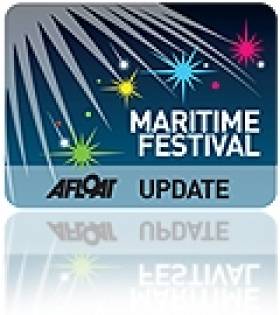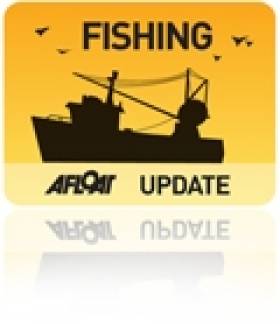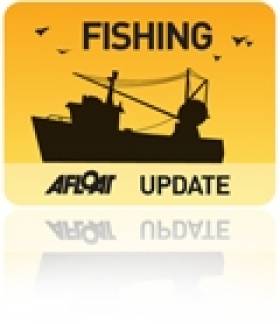Displaying items by tag: Seafood
Scottish Oyster Shucker to Compete in Galway World Championships
Son of oyster farmers Hugo and Judith Vajk of Caledonian Oysters, Angus won the Loch Fyne Scottish Oyster Opening Championships in Glasgow last month, beating a dozen other competitors including his father!
"I have been opening oysters since before I could walk," he quipped, as he accepted a prize plate from Virginia Sumsion, Marketing and Events Director of Loch Fyne Oysters. "I am thrilled to have won, and excited about going to the world championships, but it will be daunting being up against so many experts. I will be putting in a lot of speed practice this week!"
Part of his prize was a trip to Galway to enjoy the annual international oyster and seafood festival, but Angus had to wait for the organisers of the world competition to confirm that his opening time of 4 minutes 5 seconds for 30 oysters was good enough to allow him to compete there.
"Angus was a worthy winner and we are delighted to sponsor his entry in the worlds. We hope he will do well and bring the cup back home!" said Virginia Sumsion.
Seafood Scotland, which helped to organise the Scottish competition at the Glasgow Riverside Festival, also wishes Angus the very best of luck. "This is the first time ever that the world oyster opening championship has had a Scottish competitor, so it is an honour for Angus to fly the flag for his country," said Marketing Manger Clare Dixon.
Fine Gael Pledges to 'Steer the Marine' in Election Manifesto
Fine Gael has pledged to reinstate the Department of the Marine in its election manifesto published today. Under the heading 'steering the marine' Fine Gael also says it will replace the Boards of all State Port companies and Harbour Commissions within one year of entering government. The full chapter dealing with Marine is below:
1.11 Supporting the Seafood Sector and Marine
Expanding the Industry: Fine Gael believes Ireland, as an island nation with a strong and valued fishing tradition has huge potential to succeed as a serious competitor in the international seafood sector. The seafood industry currently generates annual revenues of €718 million and provides direct employment for 11,000 people. With an estimated 40 million tonnes of seafood to be required annually by 2030, there is significant scope for further expansion.
Common Fisheries Policy:
We will negotiate the best possible deal for Irish fishermen in the context of the ongoing review of the Common Fisheries Policy. Our priorities are:
• A progressive reduction of discards, fishery by fishery and in all maritime regions in the EU.
• Protection of the Hague Preferences.
• A uniform and transparent regulation regime.
• A clear, independently audited database of infringements across the EU.
• The development of a sustainable aquaculture plan.
• A strong focus on seafood marketing, labelling and country of origin to ensure imports meet the same
standards on safety, hygiene, traceability, recall, information and audit.
Sea Fisheries Bill:
We will publish legislation to replace the criminal sanctions system for minor fisheries offences with an administrative sanction system to bring Ireland into line with other European jurisdictions.
Funding for Fisheries:
Fianna Fáil and Green Party in-fighting has limited Ireland's ability to draw down EU funds for seafood development. We will resolve difficulties blocking the drawdown of available funds. Aquaculture Licensing: An additional 42 million tonnes of farmed seafood will be required to keep pace with demand each year by 2030, just 20 years away. We must increase our raw material supply and expand our aquaculture sector. We will remove administrative obstacles and clear the backlog of aquaculture licences currently preventing the creation of thousands of jobs in the aquaculture sector.
Value Added Products:
Currently, 85% of all Irish seafood is commodity traded. There is a significant opportunity to generate more value from this raw material base. Fine Gael will task Bord Iascaigh Mhara with assisting Irish companies in adding value to their products through innovation.
Single Food Label:
We will create and market a single label for all Irish produce and will drive a targeted marketing campaign to grow the Irish brand in new markets.
1.12 Steering the Marine
Marine Department:
Marine and fisheries policy is currently spread across three Departments. Fine Gael will merge these responsibilities under one Department for better co-ordination in policy delivery.
National Marine and Coastal Plan:
We will develop an integrated marine and coastal planning process to reach the full potential of our coastline in fishing, aquaculture, ocean energy and tourism.
Ports Development:
We will support the development of our ports and marine sector as important drivers of economic growth. We will also replace the Boards of all State Port companies and Harbour Commissions within one year of entering government.
The manifesto is HERE
Grant Aid Announced for 129 Fisheries Projects
Grant-aid of €1,122,084 is being provided to support a total investment of €2,023,127 for safety upgrades on board fishing vessels, lobster conservation, the development of Environmental Management Systems for Ireland's fishing fleet, and a number of collectively based projects under the new Marine Environment Protection Scheme (MEPS).
"These projects will further support our fishing industry", said Minister Connick. "Based as they are on the principle of responsible fishing practices that result in premium quality Irish seafood, the environmental focus for many of these projects will be critical in sustaining Ireland's fisheries sector during this time of unprecedented economic challenge".
A range of marine environment, conservation and safety initiatives are approved. Jointly developed by the industry and Bord Iascaigh Mhara, the Seafood Environmental Management System (sEMS) and the Marine Environment Protection Scheme (MEPS), respond to the growing demand by seafood providers and consumers for access to responsibly sourced wild caught fish. Included is grant-aid of over €350,000 to assist Irish fishing vessels develop and implement Environmental Management Systems as well as undergoing third-party accreditation for the newly developed BIM Stewardship Standard. This internationally accredited (ISO65 – EN45011) standard is amongst the first of its kind worldwide. Ireland led the way with the introduction of the first such scheme for salmon in 2005 and since then has developed similar schemes for mussels and oysters.
BIM will also roll out the €419,000 Marine Environment Protection Measure, a programme aimed to maintain healthy fish stocks while simultaneously developing the marine environment. The national lobster conservation programme is also funded to the tune of €113,000 with a similar investment being made by inshore fishermen.
A full list of all the projects funded is provided below.
Sea Fisheries Development Programme
Fisheries Operational Programme – European Fisheries Fund
|
SCHEME |
Projects Approved |
Investment |
Total Grant Aid |
|
Marine Environment Protection Measure*
|
8 |
€477,366 |
€418,902 |
|
SEAFOOD ENVIRONMENTAL MANAGEMENT & CERTIFICATION GRANT AID SCHEME*
|
7 |
€740,117 |
€350,073 |
|
Shellfish Discard & Live Return Reduction scheme - Lobster conservation* |
42 |
€205,680 |
€113,124 |
|
FLEET SAFETY SCHEME
|
70 |
€483,936 |
€193,574 |
|
MARINE TOURISM SAFETY SCHEME
|
2 |
€116,029 |
€46,411 |
|
TOTAL |
129 |
€2,023,127 |
€1,122,084 |
Minister for Agriculture, Fisheries and Food Brendan Smith TD and Minister of State with responsibility for Fisheries, Sean Connick TD, today launched Bord Iascaigh Mhara's (BIM's) new three year strategy (2010 – 2012) and the Irish Seafood National Programme to 2013. The event, which was hosted by BIM at the decentralised Department and BIM offices in Clonakilty, was attended by a large audience from the wider seafood sector.
In his address, Minister Smith welcomed the opportunity to launch these two significant initiatives acknowledging how appropriate it was that they come on the same week as the launch of Food Harvest 2020, which focused on the contribution to be made by the food sector generally in Ireland's economic recovery.
Minister Smith said that both he and Minister Connick attached "a high level of importance on BIM's transformation agenda for the seafood sector and on the associated seafood development measures contained in the Seafood National Programme".
BIM's new strategy document concentrates on avenues to deliver essential developmental services to a seafood industry undergoing rapid and unparalleled change. The Minister commended BIM for clearly setting out challenging targets for themselves for delivery by 2012, including the creation of 600 jobs, an additional €50m in value added seafood sales, and greater differentiation of 40,000 tonnes of Irish seafood products worth €120m.
Minister Smith went on to say "I have consistently stated that the seafood sector, made up as it is of indigenous operators, will have a significant role to play in Ireland's economic recovery. BIM's new strategy is a welcome addition to the suite of harmonised strategies for the seafood sector including Steering a New Course, Sea Change, as well as Food Harvest 2020. It adds to and fully complements the existing strategies and positions Ireland well to maximise the very large opportunities which are presenting themselves in the international seafood markets".
Focusing on the National Programme for the development of the Seafood Sector, Minister of State Connick said "The measures contained in this Programme are the tools to enable the Government and its agencies deliver on the objectives contained in the suite of Seafood focused strategies, and places Ireland in a promising position to capture some of the undoubted opportunities which are emerging in both the international and domestic seafood markets".
Minister Connick said that the proposed investments in the seafood industry constitute a significant vote of confidence by the Government in the sector. He went on to say "The programme published today envisages a significant state investment into the Irish seafood sector from now until the end of 2013. A dedicated allocation of €6.5m is being made available for the remainder of 2010 for the development of the aquaculture and processing sectors." While the programme also facilitates access to other funding from Bord Bia for marketing, from Enterprise Ireland for processing, and from BIM for added value and innovation and fisheries support".
On the launch of the two initiatives Minister Connick said "The launch of these two complementary initiatives to drive forward the development of a modern, high value added, sustainable and expanding seafood sector is an important event in delivering the real opportunities which exist for income generation and enhanced employment in our coastal communities".



























































